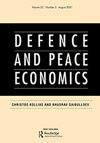经济增长对战争的催化作用
IF 1.6
3区 经济学
Q2 ECONOMICS
引用次数: 0
摘要
摘要本文解释了经济增长增加州际战争可能性的情况。高度持续的经济扩张所产生的乐观情绪渗透到一个国家,增加了精英和大众对使用致命武力的乐观情绪。如果没有救济,这种肆无忌惮的乐观情绪可能会导致国家陷入战争。然而,其他力量降低了战争的可能性。区域民主、双边贸易和贸易开放减缓了国家发动战争的进程。本文假设,关键因素提高了争端的温度,增加了政治争端演变成战争的可能性,而其他因素则抑制了战争的进程。经济增长催化了这种反应,而地区和联合民主阻碍了战争爆发的可能性。本文得出的一元和二元结果表明,经济增长增加了战争的可能性,而其他因素,如州际贸易开放、双边贸易、二元民主和地区民主,减缓了战争的进程,降低了战争的可能。本文章由计算机程序翻译,如有差异,请以英文原文为准。
Economic Growth’s Catalyzing Effect on War
ABSTRACT This paper explains the circumstances where economic growth increases the likelihood of interstate war. Optimism created by high and sustained economic expansion permeates a state, increasing elite and mass optimism for the use of deadly force. Without relief, such unbridled sanguinity can lead states to war. However, other forces reduce the probability of war. Regional democracy, bilateral trade, and trade openness slow down the process where states go to war. This paper hypothesizes that key factors raise the temperature of disputes, increasing the likelihood of a political dispute combusting to war, while other attributes inhibit the process to war. Economic growth catalyzes such reactions, while regional and joint democracy impede the probability that a war sparks. This paper produces monadic and dyadic results demonstrating that economic growth increases the likelihood of war, while other factors such as interstate trade openness, bilateral trade, dyadic democracy, and regional democracy slow down the process of war, making war less likely.
求助全文
通过发布文献求助,成功后即可免费获取论文全文。
去求助
来源期刊

Defence and Peace Economics
ECONOMICS-
CiteScore
4.00
自引率
18.80%
发文量
45
期刊介绍:
Defence and Peace Economics embraces all aspects of the economics of defence, disarmament, conversion and peace. Examples include the study of alliances and burden-sharing; military spending in developed and developing nations; arms races; terrorism; country surveys; the impact of disarmament on employment and unemployment; the prospects for conversion and the role of public policy in assisting the transition; the costs and benefits of arms control regimes; the arms trade; economic sanctions; the role of the United Nations.
 求助内容:
求助内容: 应助结果提醒方式:
应助结果提醒方式:


